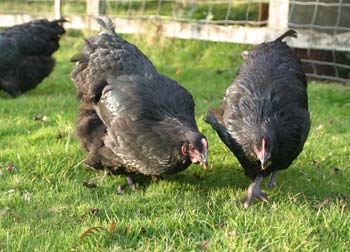We have all heard of the phrase “the pecking order”. Chickens establish a hierarchial order in their flock. This is thought to have evolved over many thousands of years in the jungle fowl of South East Asia. The pecking order allowed the flock to eat in turn and peacefully when food was available. If they were fighting at these times, they would be wasting their opportunity to eat and attracting attention to themselves from predators.
The pecking order is still well and truly with the hens of today and hens can be incredibly cruel to newcomers. If you are mixing hens that aren’t used to one another, you should make sure you are around to keep an eye open for trouble. The following points may help:
- Place newcomers behind a fence or in a small run for a week so that they can get used to their new surroundings and get used to one another.
- Introduce a new hen at night to the coop when it is dark. Place her amongst the other hens. They will not fight in the dark and it will give the others a chance to get used to the new smell.
- If pecking takes place, leave them to get on with it as much as you can. They have to establish the new pecking order but…
- If blood is drawn at any point, remove the hen and try again when the injury has healed. Chickens are attracted to red and will peck blood very quickly.
- You may want to try removing the hen that is fighting with the newcomer to the flock for a little while until the new hen has settled into the flock, then put the trouble maker back in.
If you are still having difficulty with the hens getting along, you can try an Anti-peck spray and if you have real problems, ‘bumpa bits‘ can be fitted to the beak for a while. These stop the end of the beak closing completely so prevent her from causing damage to other hens but she is still able to eat and drink normally.






Please can you advise me my bantam Pekin died two weeks ago leaving her daughter (large buff Orpington hen) on her own who is now 18 months old. Her aviary run, chicken run and house is next door to my three giant rabbits. Can she live on her own and if not should I get her a Pekin / Silkie bantam or a light Sussex / Marans to go with her and if so what age. I look forward to your advice
Chickens are happiest in flocks but introductions can be painful to watch. I would try to get a hen that’s a similar size to her.
I had 10 hens for several months, then gave a friend 2 of them two months ago. This friend wants me to keep his 2 girls while he is out of town for a week (with my 8). Should I expect there to be issues, or will they “remember” each other?
Thank you!
No, they won’t remember them – there may be problems…
Hiya, we have sadly lost one of our chickens this week and were hoping to introduce another into our little flock of three. I’ve read that it is not a good idea to introduce a lone hen into an established flock. Could I ask your opinion on this please? I would be prepared to take things very slowly! Kind regards, Lynsey.
No, that’s not really true – introducing any number upsets the flock and there will be fights until the pecking order is re-established.
Hi I’m wondering if any one could help me
I have one chicken left… I went and got a ex bat hen, there in separate coops next to each other, they fight through the wire all the time. While cleaning the one out I let the other out and they was just jumping on each other and biting onto each others waddled, attacking each other. They are still separate until the larger run has been completed. I’m worried doin the whole putting them in together at night in there new run, none of them have been in. Will they be okay…..
You can do it gradually but sometimes, I will let them both out into the garden and let them ‘fight’ a little -they are trying to establish their position and if one is stronger, the other is likely to back down.
The trick is though, not to let it go on if blood is drawn and they need lots of space to be able to get away. Once this happens, you can progress to putting them together in the dark – but ensure you’re up early to let them out (again, into the garden where there is lots of space) and provide multiple feeding points. If you scatter corn around the garden, this can also help them to keep their minds off fighting.
It almost always gets better in the end. It’s just painful to see at first – but a few flying feathers are sometimes necessary.
I’ve just put our four new hens in their coop/run today.
They are all about the same size, two are 3 weeks younger than the other two, but one of the younger ones is getting picked on lots already by one of the older ones. No blood as yet but it’s not nice to watch. The Hen we call Queenie that rules the roost is telling everyone abit but one she is pecking lots.
How long does this last for and at what point do I step in?
Thank you so much for your help
I normally only step in if there is blood drawn. Chickens are attracted to red, so bloody areas can be a problem because they will get pecked.
Hi, I had 4 chickens vorwerk, Orpington and 2 Pekin bantams. All got on fine with Orpington being top chicken then the Orpington died shortly followed by one of the pekins. Now all the Vorwerk does is bully the other Pekin drawing blood I sprayed it purple, I’ve put various feeders out, then tried separating them both. They could still see each other but after a week the vorwerk is drawing blood again. was thinking of getting 2-3 more chickens so the Pekin wont be receiving all the beatings or will this make it worse if not what type of breed? Would quite like ex batts but don’t know if that’s a good combo.
There is the odd occassion when chickens just will not get on.
You could try giving them more space, more feeders, more watering points and they might be able to avoid conflict but if they still can’t get on, I would consider re-homing the bully.
Getting more hens will change the dynamics of the flock again and there will need to be a re-organisation of the pecking order. The bully hen may still be a problem but it’s also possible she will not be top hen any more and stop the aggression because a new hen will be the boss.
I had until recently four Ross Lohmann hens that are about a year old. Last week I lost one so decided to replace it with two more. We bought the much younger Lohmanns three days ago and kept them separate from the three larger and older ones. They were placed in a coop but where the three older ones could see them through the mesh. We decided today to introduce the new ones to the older ones. Almost straight away two of the older ones started attacking the younger ones, jumping on their backs and pecking at them, particularly around the neck and comb. We moved them away from each other and monitored. Occasionally the older ones would go back and attack the younger ones and we’re concerned for the younger ones. Have we done the right thing by introducing them after just three days and is this just sorting out the pecking order or something more sinister?
Yes, that’s just the pecking order. It’s worse between different ages and different sizes of birds.
If you can fence off an area and keep them in there, it gives them a chance to get used to one another first.